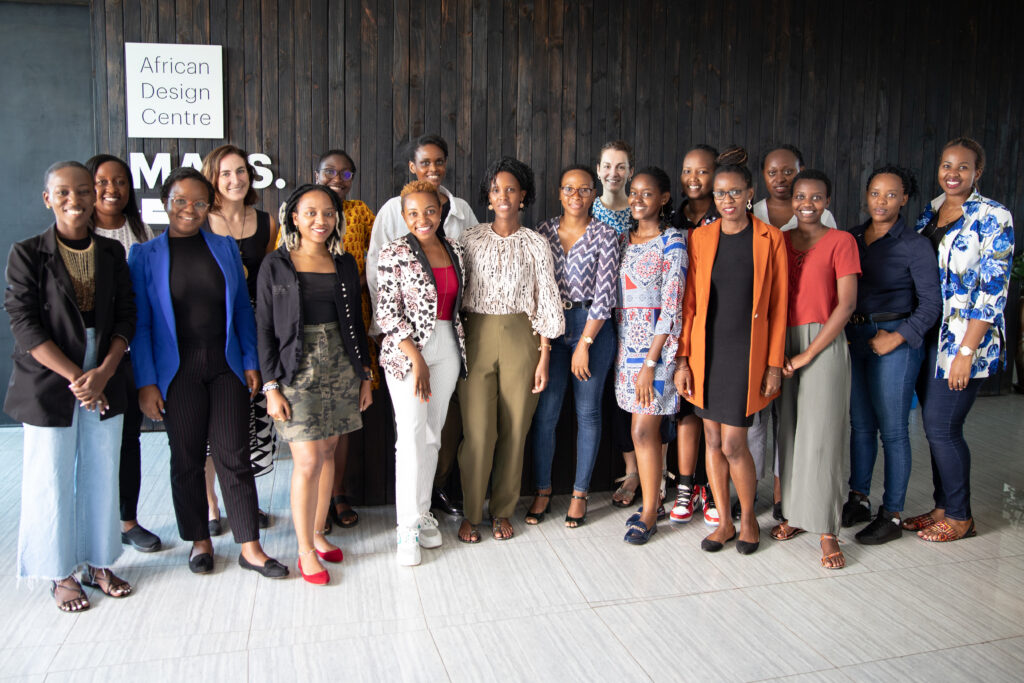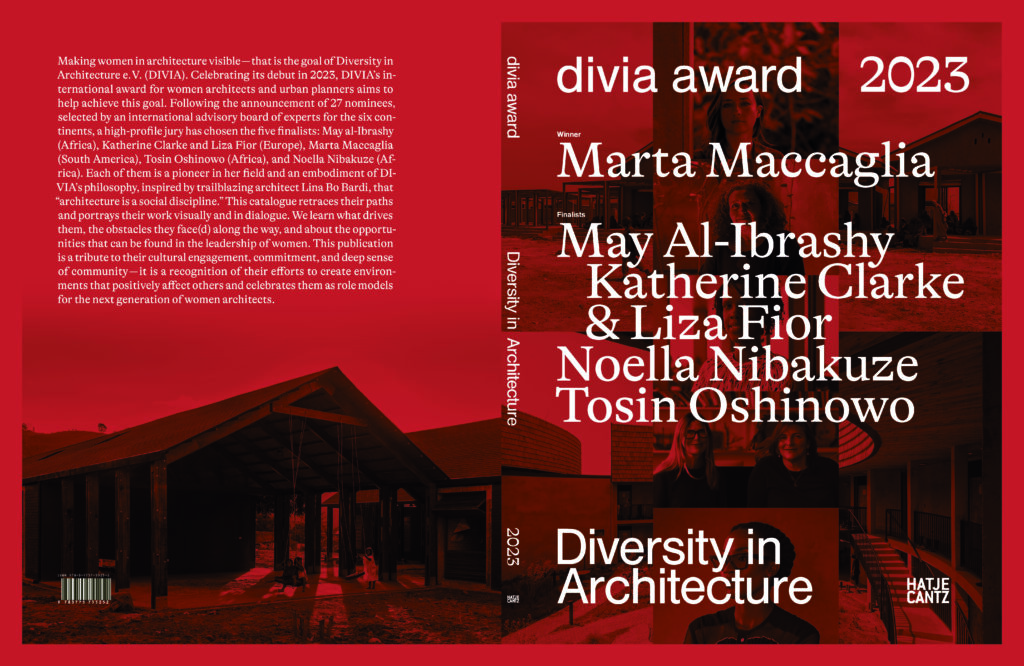DIVIA Award 2023 Finalist Noella Nibakuze: “Creating spaces for women for mutual support is so essential.”

Words: Veronika Lukashevich
A year and a half after the first DIVIA Award Ceremony in Venice, we catch up with finalist Noella Nibakuze to discuss her journey into motherhood, the transformative power of mentorship, and her mission to leave an enduring legacy on Rwanda’s architectural landscape.
The past year has brought many changes to Noella Nibakuze’s life. When we first met in person at DIVIA’s inaugural award event during the 2023 Biennale in Venice, she was a newlywed, having recently married her husband, Nelson. Today, as we connect online, she is at home, juggling life as a new mother with working remotely full-time after maternity leave.
“Flexibility has been key,” she reflects, crediting her employer, MASS Design Group, where she works as Design Director in the Kigali office. “When I first started at MASS, most of us were young and didn’t have children. Over time, the company culture shifted to accommodate family life.”
MASS sets a high standard for family-friendly policies, particularly in Rwanda, where parental leave is often limited—maternity leave generally lasts 16 weeks, while typical paternity leave is just four days. At MASS, however, fathers are entitled to three and a half months off. “Parents can even extend that to up to four and a half months, depending on holidays,” Noella notes. “It’s a significant step forward, though there’s still room for improvement.”
“Families or partners often struggle to understand the long hours, which can discourage women from continuing in the profession.”
The family-focused ethos has led to tangible changes, such as the creation of a dedicated pumping room for mothers—a need identified by Noella and her colleagues through the company’s Women’s Group. “The idea came out of our discussions,” she explains. “We realized how important it was to provide a private, safe space for mothers.”
The women’s group serves as a platform for mentorship and support—not only within MASS but also in the broader architectural community—breaking down barriers for women in the profession while addressing challenges such as work-life balance and time management.
With its notoriously demanding hours, architecture remains a challenging field for women. In Rwanda, only 13% of architects are women, with even fewer represented in engineering. “Motherhood adds another layer of complexity,” Noella explains. “Families or partners often struggle to understand the long hours, which can discourage women from continuing in the profession. That’s why creating spaces for mutual support is so essential.”

Motherhood has profoundly influenced Noella’s personal perspective and shaped the direction of her work. “It’s made my work feel even more personal,” she shares. “I think about the schools I’d want my child to attend. That’s why I’m so passionate about designing spaces for children and families.”
This focus aligns with one of the key priorities of MASS’s new three-year strategy, which places a strong emphasis on the educational and entrepreneurship sectors. “We are working with governments and education stakeholders to develop policies and design guidelines for schools and workspaces,” she says. The strategy also includes fundraising for additional research, with plans to publish their findings—potentially in a book—on how classrooms in Africa can support both formal and informal learning through play and creativity.
Building on this foundation, the team is also dedicated to innovating and creating improved learning environments, which should help “tackle issues like student dropouts at primary and secondary levels and provide opportunities for employment or entrepreneurship.”
“There isn’t a single architectural language [in Rwanda]. Most of us studied abroad, so our work reflects a mix of influences.”
When I ask Noella to describe her idea of the perfect school, she mentions the importance of learning in one’s native language: “It fosters pride in our culture and identity as Rwandans and Africans.”
Today, many children in Rwanda attend private schools with Westernized curriculums, which can create confusion about their identity. Public schools, on the other hand, are often underfunded with poorly trained teachers. “My dream is for schools in Kigali and rural areas alike to provide equal standards in facilities, curricula, and teaching quality,” she says.
Noella’s expertise and insight into the architectural world make it hard to envision her in any other profession. Growing up with a father who was both a contractor and a sculptor, she developed an early fascination with building. Yet, the path ahead was anything but clear. “Back then, architecture wasn’t something people talked about in Rwanda. I didn’t even know any architects,” she reflects.
At the time, Rwanda had no architecture schools—the first opened in 2008—so she moved to South Africa to pursue her studies. It was an opportunity to expand her horizons and gain knowledge beyond her home country. “Once I started studying, I fell in love with architecture. Despite the pressure, I never considered dropping out—I knew I’d made the right choice,” Noella says.
“I would want to create a smaller, more nimble version of MASS, making services that are feasible for every Rwandan.”
Her early career unfolded against a backdrop of significant challenges. At the time, much of the construction work in Kigali was driven by engineers focused on speed rather than sustainability, as the city faced the pressures of rapid urbanization. This marked a stark contrast to earlier decades, such as the 1980s and 1990s, when there was a focus on environmental consciousness and the use of local materials. By the 2000s, architectural trends began to shift toward imported styles, heavily influenced by China, favoring designs featuring extensive glass and other unsustainable materials.
Thankfully, over the past 10 to 15 years, there’s been another shift back toward sustainability. “Organizations like MASS have shown what’s possible with local materials and environmentally friendly designs,” Noella says. People are becoming more aware of architecture’s potential, and the building codes now reflect these priorities. “It’s exciting to see a growing interest in architecture that combines global influences with local needs.”
Group photo at the DIVIA Award 2023 ceremony in Venice by Nicanor Garcia: f.l.t.r.: Jury member Martha Thorne, DIVIA editor Veronika Lukashevich, DIVIA finalists Tosin Oshinowo, Noella Nibakuze, DIVIA winner Marta Maccaglia, DIVIA finalist Liza Fior, DIVIA Founder and Chair Ursula Schwitalla
Together with a group of fellow Rwandan architects, Noella is currently at the forefront of shaping her country’s architectural identity, striving to define what it means to build authentically in Rwanda. “There isn’t a single architectural language here,” she explains. “Most of us studied abroad—in South Africa, the U.S., or Europe—so our work reflects a mix of influences.”
This blend of perspectives has also influenced her aspirations as she dreams of opening her own studio someday. “I would want to create a smaller, more nimble version of MASS, making services that are feasible for every Rwandan,” she shares.
Noella’s vision includes sustainable housing designs that cater to local needs while empowering women in architecture and related fields. She hopes to make this transition sometime in the future, acknowledging the learning curve ahead. Managing a business is a whole other skill set, so she’s considering taking a course to prepare for it, all the while feeling supported by her company. “I believe it’s possible, especially because MASS’s philosophy has always been about mentoring local architects, with the potential outcome of them opening their own offices if they choose to,” she reflects.
This philosophy of mentorship and empowerment resonates deeply with Noella, who has also found support in being a finalist for the DIVIA Award 2023. The honor not only celebrated her achievements but also connected her with a global network of women, including fellow finalist May al-Ibrashy from Egypt, Tosin Oshinowo from Nigeria, and winner Marta Maccaglia from Peru, with whom she continues to stay in touch.
For her, this recognition has been about more than personal success. “Coming from Rwanda and being on these big platforms—it’s not easy, trust me,” she says. (Following her recognition as a finalist, she also served as a judge for the Dezeen Awards 2024.) “I’m very aware of that and of how privileged I am to be there. I see it as a duty. It’s about showing others that it’s possible—you can come from Rwanda, from Africa, and achieve great things.”
As Rwanda’s architectural language evolves, Noella continues to bridge global influences with local traditions. Her work challenges stereotypes, empowers women, and envisions a future where architecture is a tool for social transformation.
In her own words, “Representation matters. When young women see someone like me—a mother, an architect, a leader—they realize they can do it too. That’s the legacy I want to leave.”
And it’s a legacy that’s already well underway.
Did you like this profile? Make sure to share it on your socials and tag us!
